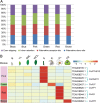Global dissection of alternative splicing uncovers transcriptional diversity in tissues and associates with the flavonoid pathway in tea plant (Camellia sinensis)
- PMID: 30400863
- PMCID: PMC6219262
- DOI: 10.1186/s12870-018-1497-9
Global dissection of alternative splicing uncovers transcriptional diversity in tissues and associates with the flavonoid pathway in tea plant (Camellia sinensis)
Abstract
Background: Alternative splicing (AS) regulates mRNA at the post-transcriptional level to change gene function in organisms. However, little is known about the AS and its roles in tea plant (Camellia sinensis), widely cultivated for making a popular beverage tea.
Results: In our study, the AS landscape and dynamics were characterized in eight tissues (bud, young leaf, summer mature leaf, winter old leaf, stem, root, flower, fruit) of tea plant by Illumina RNA-Seq and confirmed by Iso-Seq. The most abundant AS (~ 20%) was intron retention and involved in RNA processes. The some alternative splicings were found to be tissue specific in stem and root etc. Thirteen co-expressed modules of AS transcripts were identified, which revealed a similar pattern between the bud and young leaves as well as a distinct pattern between seasons. AS events of structural genes including anthocyanidin reductase and MYB transcription factors were involved in biosynthesis of flavonoid, especially in vegetative tissues. The AS isoforms rather than the full-length ones were the major transcripts involved in flavonoid synthesis pathway, and is positively correlated with the catechins content conferring the tea taste. We propose that the AS is an important functional mechanism in regulating flavonoid metabolites.
Conclusion: Our study provides the insight into the AS events underlying tea plant's uniquely different developmental process and highlights the important contribution and efficacy of alternative splicing regulatory function to biosynthesis of flavonoids.
Keywords: Alternative splicing; Camellia sinensis; Flavonoid; Tissue-specificity.
Conflict of interest statement
Ethics approval and consent to participate
Not applicable
Consent for publication
Not Applicable
Competing interests
The authors declare that they have no competing interests.
Publisher’s Note
Springer Nature remains neutral with regard to jurisdictional claims in published maps and institutional affiliations.
Figures






Similar articles
-
Global transcriptome and gene regulation network for secondary metabolite biosynthesis of tea plant (Camellia sinensis).BMC Genomics. 2015 Jul 29;16(1):560. doi: 10.1186/s12864-015-1773-0. BMC Genomics. 2015. PMID: 26220550 Free PMC article.
-
Comprehensive identification of the full-length transcripts and alternative splicing related to the secondary metabolism pathways in the tea plant (Camellia sinensis).Sci Rep. 2019 Feb 25;9(1):2709. doi: 10.1038/s41598-019-39286-z. Sci Rep. 2019. PMID: 30804390 Free PMC article.
-
Comprehensive co-expression analysis provides novel insights into temporal variation of flavonoids in fresh leaves of the tea plant (Camellia sinensis).Plant Sci. 2020 Jan;290:110306. doi: 10.1016/j.plantsci.2019.110306. Epub 2019 Oct 15. Plant Sci. 2020. PMID: 31779914
-
Flavonoid metabolites in tea plant (Camellia sinensis) stress response: Insights from bibliometric analysis.Plant Physiol Biochem. 2023 Sep;202:107934. doi: 10.1016/j.plaphy.2023.107934. Epub 2023 Aug 3. Plant Physiol Biochem. 2023. PMID: 37572493 Review.
-
Anthocyanin metabolism and its differential regulation in purple tea (Camellia sinensis).Plant Physiol Biochem. 2023 Aug;201:107875. doi: 10.1016/j.plaphy.2023.107875. Epub 2023 Jul 9. Plant Physiol Biochem. 2023. PMID: 37451003 Review.
Cited by
-
Comprehensive profiling of alternative splicing landscape during cold acclimation in tea plant.BMC Genomics. 2020 Jan 20;21(1):65. doi: 10.1186/s12864-020-6491-6. BMC Genomics. 2020. PMID: 31959105 Free PMC article.
-
Comprehensive analysis of the laccase gene family in tea plant highlights its roles in development and stress responses.BMC Plant Biol. 2023 Mar 7;23(1):129. doi: 10.1186/s12870-023-04134-w. BMC Plant Biol. 2023. PMID: 36882726 Free PMC article.
-
Comprehensive analysis of alternative splicing in Rosa roxburghii Tratt reveals its role in flavonoid synthesis.Front Plant Sci. 2025 Jul 11;16:1627126. doi: 10.3389/fpls.2025.1627126. eCollection 2025. Front Plant Sci. 2025. PMID: 40718022 Free PMC article.
-
Tea plant genomics: achievements, challenges and perspectives.Hortic Res. 2020 Jan 1;7:7. doi: 10.1038/s41438-019-0225-4. eCollection 2020. Hortic Res. 2020. PMID: 31908810 Free PMC article. Review.
-
Establishing a System for Functional Characterization of Full-Length cDNAs of Camellia sinensis.Int J Mol Sci. 2019 Nov 25;20(23):5929. doi: 10.3390/ijms20235929. Int J Mol Sci. 2019. PMID: 31775391 Free PMC article.
References
-
- Shi CY, Yang H, Wei CL, Yu O, Zhang ZZ, Jiang CJ, Sun J, Li YY, Chen Q, Xia T, Wan XC. Deep sequencing of the Camellia sinensis transcriptome revealed candidate genes for major metabolic pathways of tea-specific compounds. BMC Genomics. 2011;12:131. doi: 10.1186/1471-2164-12-131. - DOI - PMC - PubMed
MeSH terms
Substances
Grants and funding
- 31171608/National Natural Science Foundation of China
- 15czs08032/Special Innovative Province Construction in Anhui Province
- 2016080503B024/Special Project for Central Guiding Science and Technology Innovatio of Region in Anhui Province
- IRT1101/Programme for Changjiang Scholars and Innovative Research Team in University
LinkOut - more resources
Full Text Sources
Research Materials

